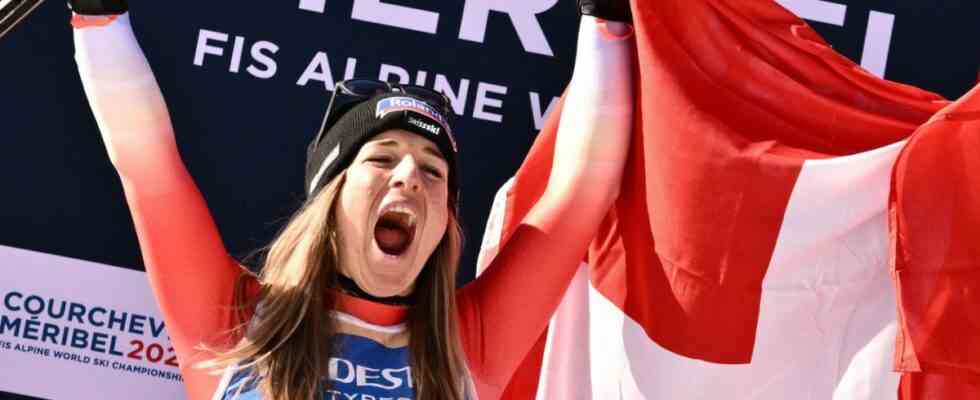One had to start with the defeated. With Sofia Goggia, of course, the Italian who had dragged a favorite status to France at these Alpine World Ski Championships that was as high as Mont Blanc. Now she persevered at the finish, her eyes fixed on the target slope under the cinema-screen-sized ski goggles, where she had just missed a goal. Then she stared at the scoreboard – as if it were a bad dream that the alarm clock was about to wake her from.
Or Kira Weidle, the 26-year-old from SC Starnberg. Two years ago she had won silver in the downhill at the World Championships in Cortina d’Ampezzo, now she had decided to do a little more with her body and stomach discipline. Instead, a long-drawn-out scream echoed through the finish line in Méribel when Weidle got there – the feeling that her ride had given her was not at all compatible with the eighth place that the result list showed her.
And so you inevitably ended up with the winner. Jasmine Flury, 29, also kept her mouth open on Saturday, and a great many tears rolled down her cheeks. The Swiss won a Super-G World Cup in St. Moritz in 2017, and a year ago she was on a World Cup podium again, finishing second in the downhill from Garmisch-Partenkirchen. Otherwise, she drove mostly in the wake of the best. Well, world championships like to put the outsiders in the spotlight, where everything flows together in one run, like Canadian James Crawford last time in the Super-G – but was it so easy to transfer that to this Saturday, the day of the open mouths?
Not only Weidle later puzzled over what had happened in the upper passage on the “Roc de Fer”. Goggia, the Slovenian Ilka Stuhec, the Austrian Mirjam Puchner, they all lost a lot of time in the flatter passage, where they never lose time otherwise. Weidle tried very hard not to attribute too much involvement to chance, but she had to be honest, she said: Those who had set out first on this descent didn’t seem to have been particularly disadvantaged. Flury started with start number two, her credit was four hundredths of a second to the Austrian Nina Ortlieb, daughter of Patrick Ortlieb, who raced to Olympic gold in the neighborhood of Val d’Isère in 1992. Of the favorites who were later, only Corinne Suter came 12 hundredths closer, as third.
Was it the wind? The sun that had softened the slope? Weidle wasn’t able to say that, only this much: “I thought, that’s not possible, that was really a good, dedicated ride.” In the further course she had at least lost hardly any time on the winner. It was the only good feeling that carried her out of the first week of the World Cup. In the Super-G she had steered over a stone and had no chance with blunt skis, now a real run at the obviously wrong time.
“I thought, that’s not possible, it was really a good, dedicated ride”: Kira Weidle has to be content with eighth place in her favorite discipline.
(Photo: Daniel Goetzhaber/Gepa/Imago)
But you shouldn’t put the random winner label on Flury either. She later assured her that her trip had gone very well. She has also been a member of a strong Swiss selection in the fast disciplines for years, with Priska Nufer, Joana Hählen and Suter. Flury was even the first of this community to achieve great success in 2017, triumphing in the Super-G in St. Moritz. But then it was Suter who had great success, World Championship gold in the downhill from Cortina, Olympic gold in Beijing a year ago. Flury found it difficult to show her good practice runs in the race, a classic of professional sports. But that’s also a quality: not losing courage when there are many arguments against you.
Flury grew up in Monstein, 200 inhabitants, so neighboring Davos seemed like a big city, has it New Zurich newspaper told once. There wasn’t even a ski lift on site, just a gymnasium, a sand pit behind the church, and plenty of trails for biking into the countryside. At some point she planted the idea in her head of making it in skiing, although she did not pass the entrance exam at the performance center in Davos and never attended a sports school. Nevertheless, she decided against an apprenticeship and opted for the detour through lower-class association cadres, through rehabilitation and rehabilitation training. Until that one day in the light.
Saturday was also a reminder that they still exist: the mountain farmers’ daughters and sons, in whose villages little more than a dozen people live (as in the case of the Swiss Daniel Yule) or whose grandfathers built the only ski lift in town (as in the case of Beat Feuz) – even if climate change is drying up these small biotopes more and more frequently.
And this wild descent was probably worth it because now these episodes from the victor’s vita were revealed: how Flury’s father Georg moved to Washington in the 1970s, worked as a confectioner at the “Watergate” hotel and baked a three-tiered birthday cake there for Walter Mondale, Vice President Jimmy Carter. Monstein near Davos apparently appealed to Georg Flury more, he took over his parents’ farm there. “You can see the team, the family that have supported me all these years,” said Jasmine Flury on Saturday, that was the best thing: “That I can now give something back to them.”

